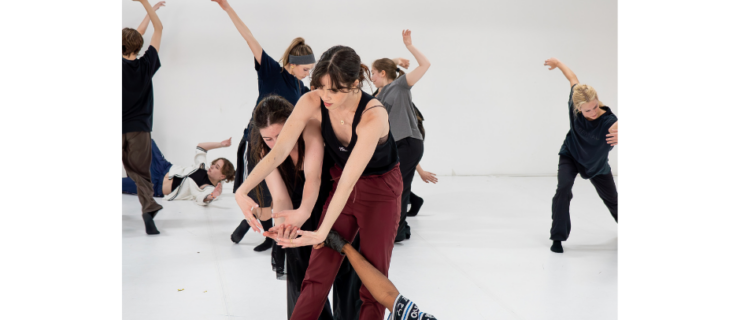Jodi Melnick’s Blues: Loss is everywhere and loss makes art
Jodi’s concert at The Kitchen is beyond beautiful; it’s more than just showing her solo choreography. It reveals her state of mind after a tragic loss in her life, and it allows us to connect with her on that level. We forgot about judging it and just entered her environment. At least that’s how I felt, and I was one of many who know her. I don’t know if others read it the way I did.
She hardly ever looked into the audience, which was fine with me. Lingering in an interior world, she downplayed her charisma and kept movement exploration a priority. I saw threads of Trisha Brown, Susan Rethorst, Vicky Shick, and Sara Rudner. Jodi’s point wasn’t to stake out new territory. She wove these threads of postmodern foldings and ripples and randomness (shades of Yvonne Rainer’s Trio A) into of tapestry that reflected her falling apart and putting herself together over time.
In the first piece, Fanfare, the set created by Burt Barr gave her a stunning, meditative space to be her elegant self. Two double electric fans sat on chairs whirring away. Video projectors threw light on them so they shimmered silver, and their shadows loomed like black mandalas shifting on the back wall. It also served as a prologue. You could watch as the shadows looped and doubled and echoed. Pretty gorgeous, and all done with low-tech ingenuity like in the 60s. (It reminded me a bit of Trisha Brown’s Homemade, in which she danced with a projector on her back that threw film footage onto the wall.) The vintage fans brought back to me hot summers in the 60s. The sound score released spurts of steam heat (sound design by Joel Mellin.) At one point, Jodi arched her head back and I could just feel her sweating, ravished, or maybe just waiting.
When Dennis O’Connor entered, the two lowered to the floor in unison phrases but never touched. Her movements become more sensual, as though his mere presence reminded her of what can happen between a man and a woman. The lights went out. Simple, evocative, sad, incomplete.
Those who knows Jodi or who had read the interview in Time Out New York know that this incompleteness is what she had to contend with when she lost a loved one. It was hard not to see, feel, her performance through this filter of knowledge and sympathy. For once I was glad to be in the front row, enveloped by the intimacy that she and Burt created.
In the other piece, Suedehead, she mimes picking up a little sick bird, or kitten. The animal seems to bring her new life. An odd little gulping noise emerges from her throat—maybe it’s an ingested bird chirp. She keeps doing it and it’s funny is a non-laughing way, like a mini stuck-inside hiccup. Finally she exhales with a death rattle. Was that the bird getting free? Was it a release of her pent up sorrow?
She was intermittently joined by Vicky Shick and Juliette Mapp (just for the sake of etiquette, I should mention that I have worked with everyone mentioned in this blog including Burt Barr). In a recurring motif, each would tap her sternum and then cave in, deflated for a moment. But the whole evening was totally unsentimental.
Just as the blues in jazz developed out of the transformation of sorrow to joy, Jodi took her sorrow, added her sensuousness and her love of movement, and created a personal, enduring revelation.




